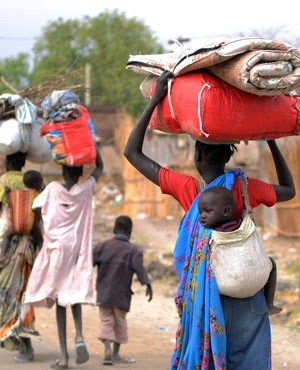Foreign News
Over 150 000 South Sudanese sheltering in UN bases

Juba – The number of South Sudanese civilians sheltering in the United Nations bases has risen above 150 000 for the first time in 18 months of civil war, the UN said on Tuesday.
A total of 153 769 civilians are now seeking safety behind the barbed wire of six peacekeeping bases of the UN Mission in South Sudan (UNMISS).
Many fled into the camps, which are spread across the country, as war broke out in December 2013 and have never left because they are too terrified to venture out for fear of being killed.
But tens of thousands more have entered the bases during an upsurge in fighting since April, taking those seeking shelter to the highest number yet. Over 10 000 have arrived in the past week alone, according to official figures released by UNMISS.
Over 28 000 are based in the capital Juba, where aid workers are trying to stamp out a cholera outbreak that has killed at least 32 people since cases were first recorded last month, including inside the UN base.
Another 91 500 are sheltering in Bentiu, capital of the northern battleground state of Unity, where a UN report last month described how South Sudan’s army raped then burned girls alive inside their homes during a recent campaign marked by “new brutality and intensity”.
More than 30 000 are also in the UN base in Malakal, capital of the north-eastern Upper Nile state.
The town has been left in ruins by intense fighting, swapping hands several times, with the government forces retaking it again on Monday after around a week under rebel control during which gunmen fired on the civilians inside the UN base.
UNMISS said that attack may constitute a war crime.
The world’s youngest nation marks on Thursday its fourth year since winning independence from north Sudan on July 9, 2011, with the UN listing South Sudan “lower in terms of human development than just about every other place on earth.”
Civil war began when President Salva Kiir accused his former deputy Riek Machar of planning a coup, setting off a cycle of retaliatory killings across the country that has split the poverty-stricken, landlocked country along ethnic lines.
Burundian general who backed a failed coup in May has threatened to launch an armed uprising after President Pierre Nkurunziza refused to bow to opposition and international demands to abandon his bid for a third term.
General Leonard Ngendakumana, a deputy to the leader of the aborted coup, accused Nkurunziza of dragging the central African country back into civil war, comments that have alarmed a region with a long history of ethnic conflict.
“The next [step] is to organise ourselves just to resist, to make Pierre Nkurunziza understand that he must leave and then that we are prepared to do it by force, by organising a military force,” Ngendakumana told Kenya’s KTN television, adding that coup leader General Godefroid Niyombare was still in Burundi.
The government told the Reuters news agency that any such move would be confronted.
“Anybody threatening the security of Burundi, either inside or outside, will meet the full force of our defence and security forces,” presidential spokesman Gervais Abayeho said.
Ngendakumana said Burundi’s government wanted “to engage the region in that civil war, based on ethnic [issues]”.
The general’s interview was recorded on Sunday in an undisclosed location outside Burundi before Monday’s meeting in Tanzania of east African states, plus South Africa, who are seeking to end the crisis.
At the meeting in the capital Dar es Salaam, the nations called for the July 15 Burundi presidential election to be delayed to July 30, to allow mediation between opposing factions.
The government has dismissed previous calls for delays.
Opponents argue Nkurunziza’s bid for a third term – which triggered weeks of violent clashes between protesters and police in Burundi’s capital – violates the constitution and a peace deal that ended an ethnically charged civil conflict in 2005.
Nkurunziza says a court ruling allows him to stand again.
| Nkurunziza makes first appearance since coup attempt |
As well as calling for an election delay, the African nations said it was appointing veteran Ugandan President Yoweri Museveni to establish a dialogue between opposing sides.
The Arusha peace accords ended a 12-year conflict that pitted rebel groups of the majority Hutus, including one led by Nkurunziza, against minority Tutsis, which commanded the army at the time.
The army and other institutions are now mixed.
Ngendakumana said followers of the coup leaders were behind a spate of grenade attacks, which often targeted police, in the run-up to parliamentary elections held on June 26.
“We are behind them, and our intent is to intensify,” he said when asked about the incidents.


